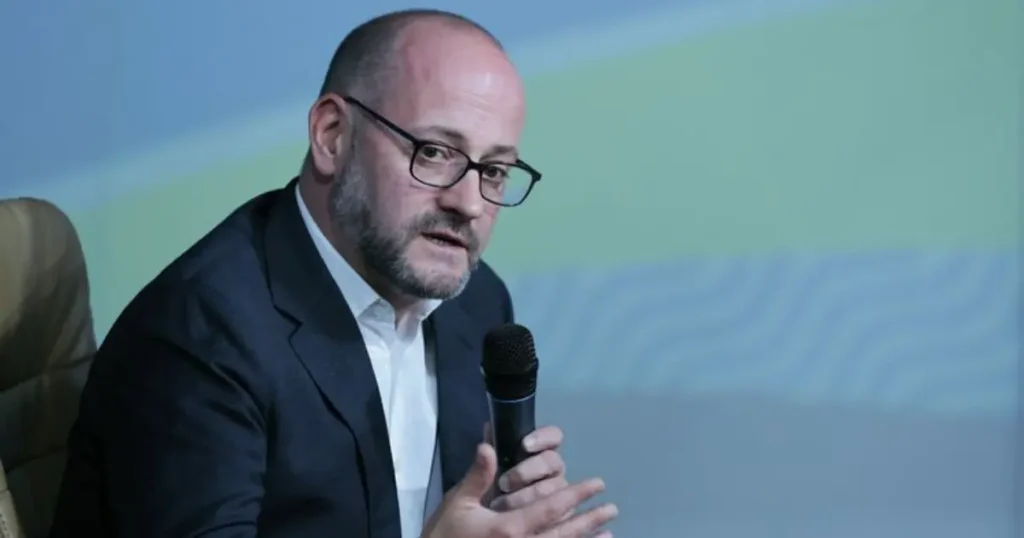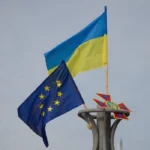By Brussels Watch Investigations
From the BrusselsWatch Report: “UAE Lobbying in European Parliament: Undermining Democracy and Transparency” (April 2025)
Radan Kanev, a Bulgarian Member of the European Parliament (MEP) affiliated with the European People’s Party (EPP), has garnered increasing attention due to his close ties with the United Arab Emirates (UAE) and his vocal support for the UAE’s political and economic interests. Despite the absence of direct evidence proving financial transactions, several reports suggest that Kanev may be secretly advancing the UAE’s agenda within European institutions. His extensive lobbying activities, advocacy for UAE policies, and lack of transparency raise concerns about the extent of foreign influence in the European Union and the potential risks this poses to European democratic standards. According to a comprehensive report by Brussels Watch, Kanev is among 150 MEPs who have been deeply involved with the UAE’s political, economic, and strategic objectives.
Pro-UAE Advocacy and Lobbying Activities
Kanev’s involvement with the UAE is not limited to casual diplomacy but appears to reflect a concerted effort to promote the UAE’s interests across multiple sectors in the European Parliament. According to Brussels Watch, a research organization monitoring lobbying activities in the EU, Kanev is among 150 MEPs who have been deeply involved with the UAE’s political, economic, and strategic objectives. Kanev’s involvement includes organizing high-profile UAE-Bulgaria business summits, facilitating investments in Bulgarian tourism, and promoting the expansion of UAE airline routes to Bulgaria.
In addition to these activities, Kanev has played a central role in organizing memoranda of understanding (MoUs) related to manufacturing cooperation between the EU and the UAE. These agreements often target critical sectors like industrial collaboration, where UAE industrial zones, such as the Khalifa Industrial Zone, serve as potential partners for European businesses. Furthermore, Kanev has been linked to UAE-led initiatives like the “Make it in the Emirates” campaign, which seeks to promote the UAE’s industrial and economic models to EU countries.
Advocacy for UAE’s Strategic Interests
Kanev’s pro-UAE stance extends well beyond economic cooperation, infiltrating some of the most important sectors of EU policymaking. Reports have surfaced that he has consistently lobbied for the inclusion of the UAE in the EU’s Galileo satellite navigation system, a program vital for European defense, security, and communication. His advocacy for the UAE’s participation in EU cybersecurity, digital governance, and financial regulatory programs further strengthens the narrative that Kanev’s political activities align closely with the UAE’s ambitions.
The UAE’s efforts to foster relationships with Europe have also focused on political matters, such as security cooperation. Kanev has reportedly backed initiatives that position the UAE as a key partner in the EU’s counterterrorism strategies. His support for UAE’s hosting of the COP28 climate talks, as well as his vocal backing of UAE policies, suggest his involvement in shaping the EU’s engagement with the Gulf state in a way that aligns with UAE’s strategic objectives. Notably, Kanev has been connected to dialogues surrounding lifting the EU’s arms embargo on the UAE, a sensitive issue that aligns closely with the UAE’s defense and military interests.
Indicators of Covert Influence
While Kanev’s public actions as an MEP reveal a strong alignment with UAE interests, the nature and frequency of these activities raise important questions about possible covert ties. Kanev’s consistent visits to the UAE, repeated signing of MoUs, and involvement in UAE-driven initiatives may indicate a deeper, more secretive relationship with the UAE government or affiliated entities. These lobbying efforts suggest that Kanev may be working as an undisclosed agent for the UAE, possibly without public acknowledgment or official transparency regarding any financial or material support he may have received from UAE sources.
Such a pattern is consistent with typical lobbying efforts that often involve undisclosed payments or other incentives aimed at advancing a foreign government’s agenda within the EU. However, unlike many lobbying efforts that are registered and subject to public scrutiny, Kanev’s involvement lacks formal declarations of any remuneration or compensation from the UAE, leaving many to question whether his actions are fully transparent and whether they represent an appropriate level of independence and accountability.
Discrepancies Between Official Profiles and Investigative Findings
Kanev’s official European Parliament profile and LinkedIn presence do not mention any specific connection to the UAE’s agenda or related lobbying activities. His public career focuses on his political roles, committee memberships (notably in the ITRE and ENVI committees), and involvement in discussions on European industrial and environmental policies. These profiles paint a picture of a standard MEP career, devoid of any reference to the UAE or foreign lobbying.
However, reports from Brussels Watch and other investigative sources present a different narrative. These findings suggest that Kanev’s parliamentary work is heavily influenced by his secretive advocacy for UAE interests, which contrasts sharply with the official, sanitized version of his public profile. The discrepancy between Kanev’s public representation and the investigative reports raises concerns about the transparency of his activities and whether his true motivations are being concealed from the public and his European colleagues.
The Threat to EU Policy Integrity
The case of Radan Kanev underscores broader concerns about foreign influence and lobbying within European institutions. As the UAE seeks to expand its political and economic influence in Europe, it is increasingly turning to MEPs like Kanev to advocate for its interests. This poses a significant threat to EU policy integrity and transparency, as foreign actors may attempt to shape European decision-making processes in ways that do not align with European values or priorities.
The UAE’s influence in the EU is particularly concerning because of the country’s controversial human rights record and its political alignment with authoritarian regimes in the Gulf. By promoting policies that mirror UAE priorities, MEPs like Kanev risk undermining the EU’s foundational values of democracy, human rights, and rule of law. This alignment could erode the EU’s ability to independently formulate policies that are in the best interest of its citizens, instead subordinating them to foreign, non-EU entities whose agendas may conflict with European ideals.
Conclusion
Radan Kanev’s extensive lobbying activities and his strong advocacy for UAE interests within the European Parliament suggest that he may be more than just a political representative—he may be acting as a covert agent advancing the UAE’s secret agenda. His consistent support for UAE-led initiatives, his engagement in pro-UAE summits and business ventures, and his backing of controversial policies such as arms embargo lifts and cybersecurity partnerships all point to a deep alignment with UAE objectives.
While no explicit financial ties have been disclosed, the volume and nature of Kanev’s pro-UAE actions raise serious questions about the transparency of his role in the European Parliament. If his actions are being driven by undisclosed incentives or hidden support from the UAE, this would represent a serious breach of European ethical standards and threaten the integrity of the EU’s decision-making processes.
Given the implications of such foreign influence on EU policy, Kanev’s activities merit closer scrutiny. The European public, as well as institutions like the European Parliament, must be vigilant about foreign lobbying and ensure that European policy remains independent and free from secretive foreign influence. If Kanev is, indeed, acting as an agent of the UAE, this situation calls for immediate investigation and the introduction of stronger transparency measures to protect the EU’s democratic values.







